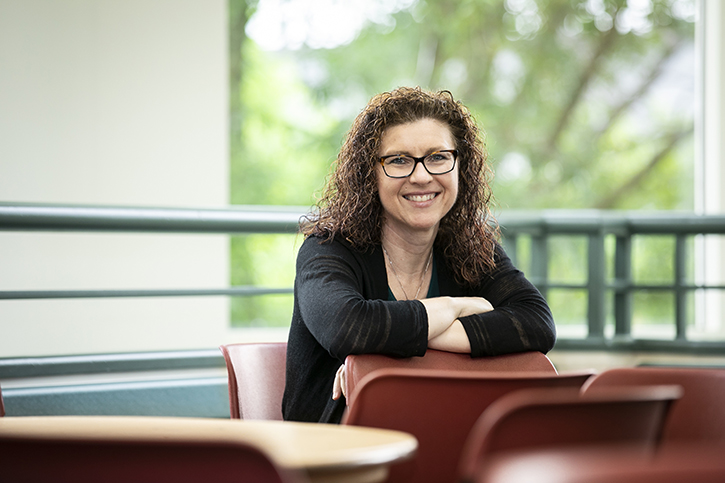
Shannon Davis, Faculty Senate Chair, director of graduate programs in sociology and interim senior associate dean in the College of Humanities and Social Sciences. Photo by Ron Aira.
Shannon Davis believes healthy communication between George Mason University faculty and administrators is essential to the success of the university. As incoming Faculty Senate chair, she plans to make that the focus of her new role.
Davis ran unopposed after serving on the Faculty Senate for three years, including two on the executive committee. She succeeds Keith Renshaw, who served the limit of three one-year terms.
“Keith has left the proverbial ‘big shoes’ in his leadership on campus,” Davis said, citing online education expansion and class distribution among campuses as two key issues. “We want to continue his tradition. As faculty, we play a vital role as in making sure that the student experience at Mason serves every Patriot. As a university, we have remarkable opportunities in front of us, and the faculty is proud to lead in Mason’s growth.”
Healthy discourse is what initially drew Davis to Mason, first as a sociology professor and now as both director of graduate programs in sociology and interim senior associate dean in the College of Humanities and Social Sciences.
When Davis interviewed at Mason in 2005, it was not the usual faculty perks that most enticed her. It was listening to faculty recount over breakfast the substantive exchanges they routinely have with engaged, hardworking students.
“That’s what sold me,” Davis said. “After all, it is the students here who continually energize and refresh what the university embodies. And the fact that my peers emphasized this interaction as a primary aspect of their work says something about these students as well as the mentality and the ideas that Mason faculty bring to their jobs.”
Davis, from Charlotte, North Carolina, attended or worked at three public universities in her home state before coming to Mason to help launch a doctoral program in public and applied sociology. The first-generation college graduate, whose Mason honors include an Office of Student Scholarship, Creative Activities and Research (OSCAR) Mentor Award in 2012, a Teaching Excellence Award in 2013, and one of OSCAR’s inaugural Sustaining Mentor Excellence Award this spring, is drawn to Mason’s mission of educating students who remind her of herself.
“Much of the reason why I’m here is because other people invested in me,” she said. “That’s an incredible and humbling gift. In the course of my career, I have seen students make remarkable strides once they have someone to believe in them and support their aspirations. So it is a personal passion of mine to be able to invest in others and help them to grow their own dreams. If I can facilitate opportunities for our students, I feel like I have truly succeeded.
“Regardless of administrative changes, regardless of buildings, parking, whatever day-to-day concerns arise—as they do in any organization with as many moving parts as Mason, the core mission of this place remains the same: Providing the opportunities for students, regardless of where they’re coming from, to work with really passionate faculty members who can see something in the students that they may not even see themselves. I am at Mason because that is who we are at our heart.”
